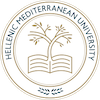General Information
The Department was established in 1999 under the name “Department of Nutrition and Dietetics” and continues to operate as the “Department of Nutrition and Dietetics Sciences” following the foundation of the Hellenic Mediterranean University (HMU). The Department became part of the Higher Education University Sector under Law 4610/2019, titled “University and Technological Educational Institutions Synergies, Access to Higher Education, Experimental Schools, General State Archives, and Other Provisions.” It belongs to the School of Health Sciences and is based in Sitia.
Field of Study
The Department of Nutrition and Dietetics Sciences at HMU offers a four-year study program focusing on the science of Human Nutrition and Dietetics, with a strong emphasis on its practical application. This discipline concentrates on:
- Meeting the nutritional needs of individuals at all stages of life (infancy, childhood, adolescence, youth, middle age, and old age) and under special conditions (e.g., pregnancy, breastfeeding, athletic activities, military service, etc.).
- Protecting human health from degenerative diseases.
- Restoring human health through dietary support and patient treatment.
Mission
The mission of the Department is to develop and disseminate appropriate knowledge in the fields of science and technology through student education. It aims to equip students with the ability to utilize and advance modern methods in Human Nutrition and Dietetics. In this context, the Department:
- Develops a solid theoretical foundation by adapting course content to current advancements.
- Provides high-level laboratory and practical training, incorporating modern technologies into education.
- Cultivates skills and competencies that enable students to compete in both national and international environments.
- Conducts research in collaboration with other higher education and research institutions or companies and works with organizations related to the field of study.
- Engages in outreach activities with society.
Professional Rights
Graduates of the Department meet the legal requirements to practice as Dietitians-Nutritionists and provide services according to their professional rights, as defined by Presidential Decree (P.D.) 311/1997 (Government Gazette A’ 221) and P.D. 78/1989 (Government Gazette A’ 36). For employment in the public sector, graduates holding a degree in Nutrition and Dietetics are classified under the job category/specialization of “PE Dietetics,” according to the updated Qualifications Framework (P.D. 85/2022, Government Gazette 232/t.A’/17-12-2022).
